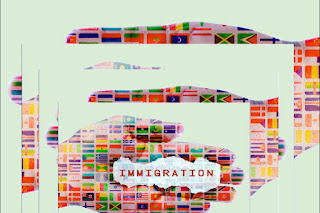Any and all unlawful entrants in Bahamian territory will be swiftly processed and repatriated to their homeland
During my last communication, he said - “I stated that I know and fully accept that we will be measured by our work, our results and not our speeches. I further stated that The Department of Immigration is committed to doing the work needed to deliver the results that the Bahamian people demand.
"Our work to address this pressing issue did not commence with my communication," he said, "nor did it commence with the many false articles and stories authored by fringe groupings, this work began ‘ON DAY ONE.’
Within months of coming to office, this administration, led by the Hon. Philip Brave Davis Prime Minister and Minister of Finance, uplifted the spirits of a demoralized and broken Immigration Department by immediately remedying the longstanding confirmations and promotions of officers in various ranks which were left outstanding by the former administration from as far back as 2014.
“I might add, this directly impacted more than 250 Immigration Officers or more than 30% of the human resource of the Department.”
Minister Bell continued that the administration immediately recruited and commissioned the largest immigration squad in the history of the Department, “increasing the total number of immigration officers by over 30%. THIRTY PERCENT.”
He noted: The Progressive Liberal Party government also made ‘the single largest investment in the history of the Royal Bahamas Defence Force’ with an injection of over $200M to upgrade the Defence Force through the 'Sandy Bottom Project': "We bought a whole new fleet of vessels including HMBS Lawrence Major, the first ‘roll on, roll off’ vessel of its class acquired by the organization.
“In anticipation of present circumstances,” Minister Bell said, “we established a temporary holding facility in Inagua with the capacity to hold over eight hundred (800) persons.
“This is to reduce the time required for irregular migrants intercepted in the Southern Bahamas to be returned to their home countries.
"I warned persons that any undocumented migrants will be taken into custody on January 18. This was extended to persons working without a valid Work Permit or working outside the scope of their work permit. This warning was further extended to persons who enter the Country as a visitor and illegally engage in employment and/or unlawful activities.”
The Immigration Enforcement Unit conducted operations to infiltrate a number of ‘escort services,’ January 19. It is well known that these escort services consist of persons who enter the country as 'visitor' and also overstay the time granted by immigration to remain in the country.
In one operation, an escort service known as 'The Mango Season Girls' was dismantled. Four Jamaican females were taken into custody in that sting operation. They were charged and placed before the courts, convicted, sentenced, deported and placed on the restricted List.
On the 20th January, 2023, a joint operation by Immigration and the Royal Bahamas Police Force in the eastern area netted a number of irregular migrants, one of whom was found in possession of a fraudulent Work Permit.
Just a matter of days after his last address, “a vessel carrying 396 irregular migrants from Haiti was intercepted by the United States Coast Guard in the vicinity of Cay Sal Bank. "In accordance with our plans to address an increase in interceptions, the Coast Guard was directed to transport the intercepted migrants to the temporary facility at Inagua where 375 migrants were handed over to Bahamian officials on January 24. Some 21 migrants (mainly minors) remained with the Coast Guard on their vessel."
He explained, with the activation of the temporary facility in Inagua, the Government moved to quickly deploy additional resources to support the facility. The Ministry of Health mobilized a team of Nurses and Physicians to fly to Inagua where they erected a field hospital donated by the United States government. Food and other supplies were shipped in by the HMBS Lawrence Major.
"The Royal Bahamas Police Force and The Royal Bahamas Defence Force continue to assist the Department in providing additional security on the Island.
"Unfortunately, the interception near Cay Sal was not isolated. On the 24th January - The Department of Immigration was notified that a vessel carrying unlawful entrants from the Republic of Haiti ran aground in the area of The Bluff, South Andros. Officers from The Royal Bahamas Police Force, stationed in South Andros moved swiftly and apprehended a number of the unlawful entrants to our shores. Combined with reinforcement teams from the Defence Force and Bahamas Immigration, a total of 41 persons were taken into custody following a full search of the area and surrounding communities. The 41 persons were subsequently transported to the Detention Centre here in New Providence."
On Monday the 30th of January, Immigration Officials received notification of a suspected smuggling vessel sinking in the vicinity of Grand Bahama. Law enforcement officials quickly mobilized and 19 individuals were taken into custody.
They Included:
- Eleven Haitian Nationals
- Two Ecuadorian nationals
- Two Chinese Nationals
Further, four Bahamian Males suspected of being the organizers were arrested and are expected to be placed before the Courts along with this group once the investigations are concluded.
"We are challenged, but yes, we are prepared; yes, we are ready and yes, with God’s grace and mercy, we will ride this wave! In my earlier communication, I issued a stern warning and advised the Bahamian people that any and all unlawful entrants will be swiftly processed and repatriated to their homeland."
Three repatriation exercises were undertaken, recently, by the Immigration Department totaling 251 persons including
- Thirty-one Cuban Nationals
- Two hundred-and-twenty Haitian nationals



